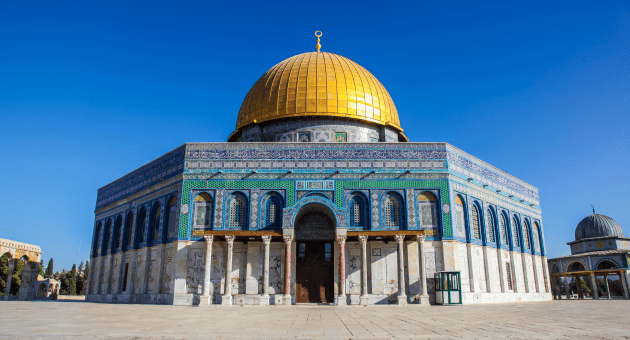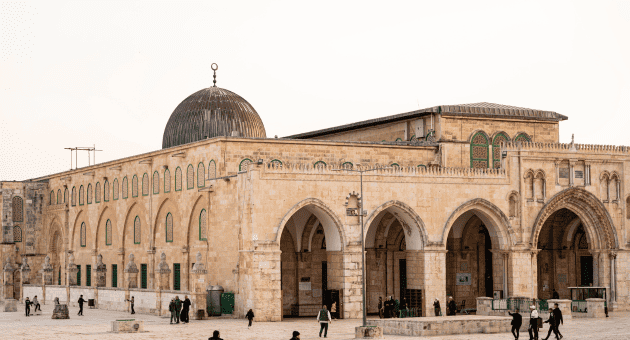Located in the Old City of Jerusalem, Al-Aqsa Mosque is a significant landmark for Muslims around the world. Its history spans over a millennium, and it has witnessed numerous political and religious events.
Let’s dive deep into the origins, significance, and architectural features of the remarkable Al-Aqsa Mosque.
The Origins of Al-Aqsa Mosque

The history of Al-Aqsa Mosque is closely tied to the Islamic prophet Muhammad. According to tradition, the Prophet Muhammad was transported from Mecca to Jerusalem in a single night by a winged horse named Buraq. This journey, known as Isra and Mi’raj, culminated with the Prophet’s ascension to heaven and a meeting with previous prophets, including Moses and Jesus.
Foundation by Caliph Omar
Shortly after the death of Prophet Muhammad, the Rashidun Caliphate under the leadership of Caliph Omar conquered Jerusalem. In the 7th century AD, Omar built a wooden mosque on the site, which was later expanded and elaborated by his successors. The mosque was named Al-Aqsa, which means ‘the farthest mosque.’
Architectural Evolution Over Time
Over the centuries, Al-Aqsa Mosque underwent many transformations, both in terms of size and architectural style. The most significant change came in the 11th century AD when the Fatimid Caliphate built the Dome of the Rock on the site. Also, the Crusaders converted the mosque into a church during the 12th century. Later, the mosque was retaken by Muslims and restored to its original purpose.
The Significance of Al-Aqsa Mosque in Islam

Al-Aqsa Mosque is one of the most sacred and revered places in Islam. Muslims regard it as the third holiest site in Islam, after Mecca and Medina. It is also the closest point of worship to the location where Muhammad ascended to heaven. As a result, Muslims all over the world regard Al-Aqsa as a spiritual site that is integral to their beliefs. They consider it a symbol of resilience against oppression and injustice.
The Night Journey and Ascension of Prophet Muhammad
For Muslims, the Al-Aqsa Mosque holds monumental significance as it is the site of one of the most extraordinary experiences of the Prophet Muhammad. They firmly believe that the journey, along with the subsequent ascension, was an act of divine intervention. As a result, Muslims revere Al-Aqsa Mosque and hold it in the utmost esteem.
The Third Holiest Site in Islam
Al-Aqsa Mosque holds a crucial significance in Islam and is the third holiest site in Islam after Mecca and Medina. It is the first Qibla (direction of prayer) for Muslims. Muslims believe that the Kaaba in Mecca was the first Qibla but later changed to Jerusalem before finally becoming Mecca. So, Muslims face Al-Aqsa Mosque while offering their prayers five times daily.
The Role of Al-Aqsa Mosque in Islamic Rituals and Worship
Al-Aqsa Mosque is a critical site for Islamic worship, as Muslims all over the world consider it an essential pilgrimage site. The mosque hosts Friday prayers, which are among the most significant congregational prayers in Islam. During the holy month of Ramadan, Muslims travel to Jerusalem to offer Tarawih prayers at Al-Aqsa Mosque. The mosque is an integral part of the religious tradition and cultural heritage of Muslims.
The Political and Cultural Importance of Al-Aqsa Mosque

The political and cultural significance of the Al-Aqsa Mosque is not limited to religious reasons. Historically, the mosque was at the centre of many political and cultural struggles that have influenced the region’s customs and politics. Two prominent examples of these struggles are the Crusades and the Israeli-Palestinian conflict.
The Crusades and the Struggle for Control
During the Crusades, the Al-Aqsa Mosque was converted into a church by the Crusaders, who used it as a headquarters for their operations. Later, the Muslims recaptured Jerusalem and restored the mosque’s original purpose. The struggle for control over Al-Aqsa Mosque continued over the centuries and played a vital role in shaping the region’s political landscape.
The Role of Al-Aqsa Mosque in the Israeli-Palestinian Conflict
The Israeli-Palestinian conflict saw Al-Aqsa Mosque at the centre of political tensions. Israelis and Palestinians have different claims over the mosque, leading to many protests and clashes. For Palestinians, Al-Aqsa Mosque is a symbol of their national identity and represents their yearning for independence. For Israelis, it represents their connection with the site as an ancient Jewish temple.
Al-Aqsa Mosque as a Symbol of Palestinian Identity
For many Palestinians, Al-Aqsa Mosque represents their heritage and identity. The mosque is an important symbol of Palestine and has always been at the centre of their struggle for independence. Many consider it a symbol of their nation’s resistance to oppression and a source of inspiration for the younger generations.
Architectural Features of Al-Aqsa Mosque

The Al-Aqsa Mosque is an architectural marvel that reflects a blend of various Islamic styles throughout history. The most notable features include the Byzantine mosaics and the mihrab’s delicate patterns. Let’s look at some of the structural highlights that make Al-Aqsa Mosque a marvel of Islamic architecture.
The Dome of the Rock
The Dome of the Rock is an impressive architectural wonder located at the centre of the Al-Aqsa Mosque. It is an iconic building that stands out with its golden dome and intricate details. The Dome of the Rock dates back to the 7th century AD and is one of the oldest existing examples of Islamic architecture.
The Qibli Mosque and the Marwani Prayer Hall
The Qibli Mosque is a stunning structure designed in the Islamic architectural style. It is located at the heart of Al-Aqsa Mosque and is where Muslims face during their prayers. The Marwani Prayer Hall is located at the base of the Qibli Mosque and consists of several underground chambers for worship and meditation.
The Al-Buraq Wall and the Western Wall
The Al-Buraq Wall and the Western Wall are two walls located at the sides of the mosque. The Western Wall is a remnant of the ancient Jewish temple, while the Al-Buraq Wall is the location where the Prophet Muhammad tethered his miraculous ride, Buraq.
Conclusion
Al-Aqsa Mosque is significant not only for its religious importance but also for its cultural and political significance. The mosque has been at the centre of many historical events that have shaped the region’s identity and influenced its future. It is always going to be a crucial site for Muslims worldwide and a nod to Palestine’s resistance and hopes for the future.


